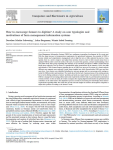Schulze Schwering D., Bergmann L., Isabel Sonntag W. (2022). How to encourage farmers to digitize? A study on user typologies and motivations of farm management information systems. Computers and Electronics in Agriculture, 01/08/2022, vol. 199, p. 1-10.
https://doi.org/10.1016/j.compag.2022.107133
https://doi.org/10.1016/j.compag.2022.107133
| Titre : | How to encourage farmers to digitize? A study on user typologies and motivations of farm management information systems (2022) |
| Auteurs : | D. Schulze Schwering ; L. Bergmann ; W. Isabel Sonntag |
| Type de document : | Article |
| Dans : | Computers and Electronics in Agriculture (vol. 199, August 2022) |
| Article en page(s) : | p. 1-10 |
| Langues : | Anglais |
| Langues du résumé : | Anglais |
| Catégories : |
Catégories principales 06 - AGRICULTURE. FORÊTS. PÊCHES ; 6.4 - Production Agricole. Système de Production ; 6.5 - Gestion des ExploitationsThésaurus IAMM AGRICULTURE NUMERIQUE ; SYSTEME D'INFORMATION DE GESTION ; AGRICULTEUR ; COMPORTEMENT DES AGRICULTEURS ; ENQUETE ; QUESTIONNAIRE |
| Résumé : | Farm Management Information Systems (FMIS) have undergone tremendous development in the recent past. With the sharp increase in documentation requirements for agricultural businesses, the potential of FMIS to become widely used comprehensive management tools is high but not yet fully exploited in practice. Consequently, there is a need to improve and adjust these systems. However, there is little research about how to optimize FMIS in order to meet the needs of the users. To answer this question, a deeper understanding of how users differ from other groups regarding their intensity of use and their perceptions of FMIS is needed but has hardly been explored so far. By means of a standardized online questionnaire in the summer of 2019, the skills and attitudes of 280 German farmers regarding the use of FMIS were surveyed. By means of a cluster analysis, different user segments were analyzed to gain deeper insights into which characteristics FMIS users and non-users have. Four clusters were identified including two non-user groups and two user groups with varying potential for FMIS providers and marketers. The results show that the lack of persuasiveness of the existing systems by not (yet) offering solutions to farmers? problems and needs is a major barrier. One main driver for the use of FMIS is to manage the increasing political and social requirements with the help of a professional documentation of farm activities. On the one hand, the results accompany the ongoing digital transformation in agribusiness and contribute on the other hand to the digitization process on farms by increasing new knowledge about farmers? requirements regarding FMIS. The results also provide relevant insights for software development companies to adjust their products according to the farmers? needs. |
| Cote : | Réservé lecteur CIHEAM |
| URL / DOI : | https://doi.org/10.1016/j.compag.2022.107133 |







